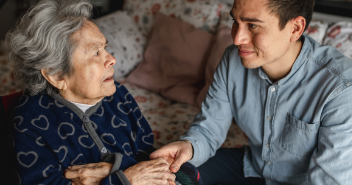
Being an Alzheimer’s caregiver is a hard road to travel.
While caring for your person, watching them change over time is not easy. Your relationship is changing too, and while the two of you may be even closer now, the increasing isolation, loss of sleep, and added stress and worry can take their toll on your health.
Research studies may offer access to Alzheimer’s experts who understand the daily challenges you face. In fact, if your person qualifies for and is enrolled in a study, the study staff will answer any questions you may have throughout their study participation. These studies also offer hope for the future, as researchers work hard to find new, effective therapies for this heartbreaking brain disease.
Let’s take the next step together.
Prefer to talk? We’d love to hear from you.
Prefer to talk?
We’d love to hear from you.
Alzheimer’s with Agitation
Alzheimer’s with agitation may include physical or verbal outbursts such as pushing, shouting or hitting. Even benign behaviors like pacing or restlessness can be signs of “agitation.” Triggers can include things like change, being pushed to do something or too much noise, for example. Men are more likely to develop Alzheimer’s with agitation, while women are more likely to develop depression due to AD.
Why Alzheimer’s Research Is So Important: AD By The Numbers
Alzheimer’s is the most common “type” of dementia, comprising an estimated 60% to 80% of all U.S. Dementia cases.
More than 6 million Americans are living with Alzheimer’s. By 2050, this number is projected to rise to nearly 13 million—more than double the current number of sufferers.
11 million Americans provide unpaid care to a person with Dementia.
Dementia Vs. Alzheimer’s: What’s The Difference?
Alzheimer’s Disease (AD) is a type of dementia, the latter of which is simply an umbrella term for “cognitive decline” such as memory loss. Dementia is not a disease. Rather, it is the result of different causes, from Alzheimer’s to stroke. However, Alzheimer’s is the most common cause of dementia, comprising up to 80% of all U.S. cases.
Roughly 6 million people in the U.S. have an AD diagnosis, with as many as 50% showing signs of agitation. Unfortunately, as the population ages the number of AD sufferers will continue to climb, which is why research into medications for all stages & symptoms of the disease is so important.
Stages Of Alzheimer’s & Unexpected Symptoms: Personality Changes
Alzheimer’s is a progressive disease, simply meaning it gets worse over time. There are 3 main stages of the disease: Mild, Moderate & Severe.

Mild
In the early (Mild) stage, a person may still be able to function fairly well, but perhaps starts to notice their memory is failing, such as forgetting common words. Their thinking ability may also start to become impaired, but they generally remain independent. You may also start to notice personality changes.

Moderate
Once in the Moderate disease stage, symptoms become more obvious as their ability to remember or think through problems becomes further impaired. They may need more help with simple daily tasks, like getting dressed in the morning or with bathing, and may be prone to wander. At this point personality changes may become more drastic and they may start to experience incontinence. They may become easily agitated and even more difficult to motivate. Or they may become more withdrawn and depressed.

Severe
In the “Severe” or final stage, they usually have difficulty carrying on a conversation. Controlling their bodily functions may also become impaired. Their physical abilities also decline, so that even their ability to walk is affected.
Alzheimer’s with Agitation
Alzheimer’s with agitation may include physical or verbal outbursts such as pushing, shouting or hitting. Even benign behaviors like pacing or restlessness can be signs of “agitation.” Triggers can include things like change, being pushed to do something or too much noise, for example. Men are more likely to develop Alzheimer’s with agitation, while women are more likely to develop depression due to AD.
How Study Matching Works

Take a quick survey
We’d like to learn more about you in order to find a study that’s a good fit. Studies may have different age or health requirements.

Get matched to a study
Based on the information you give us, we’ll try to match you to a suitable study in your area. If we can’t find a good match for you, we’ll keep you in mind for future studies and notify you when they become available.

Schedule a screening visit - in person or from your home
The study team will ask questions and check your health to make sure that the study is right for you. This visit can be conducted in person at the study clinic or by an online video call from the comfort of your home.

Make study visits
If you join a study, you may be asked to make visits to the study clinic or have online video visits. You may receive an investigational (experimental) vaccine or drug as part of your participation. You may also receive payment up to $875 for your time and travel, depending on the study.

Work with your schedule
We know that adults with cognitive issues pose certain challenges when it comes to getting them to do things—and certain times of the day can be especially hard! Rest assured that our study staff will work with you to schedule appointments at times that work best for you both.
It just takes a few minutes.





More About Clinical Research
Clinical research studies are conducted with human volunteers to learn whether a new drug, treatment, or method is safe and effective for people who have certain ailments or illnesses. Clinical research studies, also known as clinical trials, follow strict scientific standards to ensure they produce the best data available for health care decision making.
Study participants may get an investigational treatment or placebo* under the care of a doctor and other medical professionals. The word “investigational” means it isn’t available or approved yet for the regular public.
*Looks like the investigational drug but has no medicine in it.
Yes! The study team can’t tell anyone that who is participating in a research study without permission. The information collected during research studies is kept confidential, and patient names aren’t listed in any reports based on studies.
Clinical research studies need patients with a healthy mix of racial and ethnic backgrounds because drugs and vaccines can affect different groups differently. It’s very important to understand this before new treatments can be approved for everyone to use. Also, some groups may be affected by certain diseases more than others. So it’s important to strive for a diverse group of patients in research studies, as long as they meet the requirements for the studies.
If your loved one gets matched to a study and either of you have questions for the study team about safety or other concerns, please ask them! It’s very important that all questions are answered and that you feel comfortable about enrolling your loved one. Also, keep in mind that a study participant may leave a research study at any time, for any reason.
COVID-19 update — we remain open.
AcurianHealth helps connect people with research studies that offer treatment under development. Since 1998, AcurianHealth has referred 1 million study candidates to 800 studies in 70 countries.

- Greatly increased availability of video office visits
- Ensuring social distancing measures are taken in all waiting areas
- Continuing the practice of cleaning and disinfecting exams rooms thoroughly between every patient visit
- Appropriate personal protective equipment (PPE) for all staff members at our health clinics
